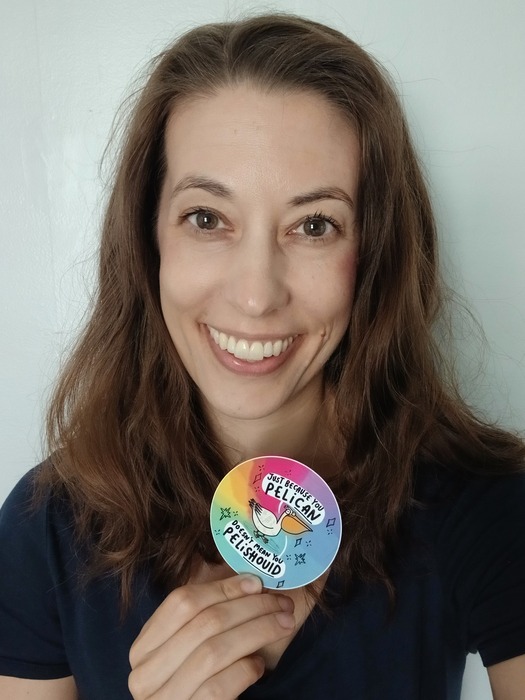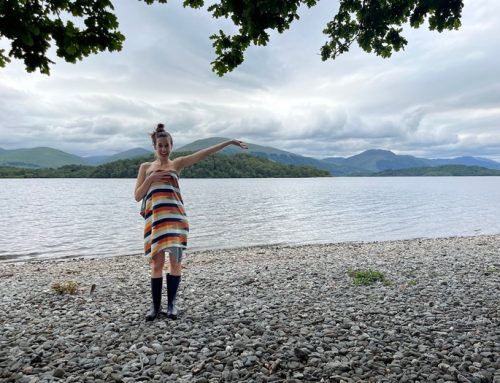Recently a dear friend sent me a sticker with a picture of a pelican on it, surrounded by these words: “Just because you PELiCAN, doesn’t mean you PELiSHOULD.”

It made me laugh and it hit me hard, all at the same time. My friend has known me for decades; she’s seen me fall into the trap of thinking that just because I’m capable of doing something, that means that I must do it.
In this post, we’ll take a deep dive into these words, because they’re powerful medicine for recovering perfectionists, insecure overachievers, and parentified daughters alike.
Just because you can doesn’t mean you should quote origin
The “Just because you can doesn’t mean you should” quote origin isn’t clear. It’s a wisdom saying, so as far as I know, we’re not sure who said it first. That being said, I must give credit for the fabulous pelican sticker to the UK-based artist Katie Abey on Etsy.
Now, some of you recovering perfectionists and raised-religious folks may be wondering, Wait, isn’t there a Bible verse about this? Sort of!
Just because you can doesn’t mean you should verse
Though I’m definitely not religious anymore – I had a lifetime’s supply of religion growing up in the WCG doomsday cult – there are some Bible verses I find helpful.
And while there isn’t a precise “just because you can doesn’t mean you should” verse, we find an adjacent idea in 1 Corinthians 6:12 and 1 Corinthians 10:23.
The latter verse reads: “‘I have the right to do anything,’ you say—but not everything is beneficial. ‘I have the right to do anything’—but not everything is constructive.”
To me, this verse dovetails beautifully with the late psychotherapist Sheldon Kopp’s words: “You are free to do whatever you like. You need only face the consequences.”
Basically, we are far freer than we realize. We really do have the right to do what we wish. And, every choice we make has an impact. Some of these impacts are beneficial and constructive, while others are not.
Just because you can doesn’t mean you should philosophy
Who among us hasn’t suffered from peliCAN syndrome, and its closely related cousin, Shiny Object Syndrome? How often do we get distracted by the shiny new thing, and neglect what’s most important to us?
Every time someone tells me that they have Shiny Object Syndrome, I’m reminded of Easter egg hunts. My kids (ages 6 and 4 as of this writing) treat Easter egg hunts like an Olympic sport; come spring, they want daily training and multiple opportunities to compete.
Needless to say, I’ve hidden a lot of plastic eggs over the years. Nowadays, I have to be clever about it. I used to be able to hide a decoy egg in front of a door, and three eggs behind it. The kids would be so excited about one egg that they wouldn’t find the rest.
The truth is, we grown-ups fall into the same trap as little kids do. It’s so easy to get hooked into the latest “great opportunity.” To add in a significant commitment, without subtracting the equivalent.
And soon we find ourselves overwhelmed, with an overloaded schedule, wondering: How did I get here again?
Often, we fall for what Cal Newport calls the “any benefit mindset.” This is the assumption that adding something to our plate is justified if there’s any good to be gained from it. So if an activity gives me any benefit at all, then that justifies the time I spend engaging in that activity.
The thinking goes: It makes sense to add in the second job (or the book club, the subscription, and so on), because look at the benefits!
This mindset can get us into so much trouble. The challenge and the gift of the world we’re living in now is that we have so many choices, so many options. And almost all of them confer some benefit. Talk about overwhelm!
Rarely do we look at the drawbacks. What is this new thing taking me away from? What will I need to subtract in order to make space for it?
We don’t talk about enough about opportunity cost. Opportunity cost means that with everything we choose to do, there comes a cost; by committing to one thing, we are choosing not to do something else.
For example, if you take an intense job with a two-year contract, that’s two years that you cannot devote to another endeavor.
It gets tricky, doesn’t it? For example: What do you do when you feel pulled to pursue a new path, but you don’t see a way to take anything else off your plate?
I have good news and bad news for you. The bad news is, you need to start subtracting now, not “once this big project is over” or “when the new year starts.” In this clip from my Subtract to Succeed class, I explain why this way of thinking is a trap.
The good news is, you can build the skill of subtracting. You can put the “just because you can doesn’t mean you should” philosophy into practice. So, let’s look at how this plays out in real time.
What are some examples from real life for just because you can doesn’t mean you should?
A decade ago, back when I was a senior copywriter for The Clearing, an elite rehab center, I heard a conversation that has stayed with me to this day.
During a marketing team meeting, the marketing director was nagging the CEO, Joe Koelzer, to finish a task that had been on his list for weeks if not months. “It will just take 20 minutes of your time!” the marketing director said.
I still remember Joe’s response. He said, “Yes, I understand. You want me to get this thing done. And it probably would take just 20 minutes. What I want you to understand is that my day is filled with people saying, ‘This will just take 20 minutes.’
If I did everything that just took 20 minutes, I would never stop. At a certain point, I simply don’t have 20 more minutes. So we can delegate this, or I will get to it when I get to it.”
I love that Joe didn’t let himself be fooled by the marketing director’s minimization. If memory serves, we figured out a way for him not to do the thing at all.
That meeting inspired a trick I use with coaching clients when they’re considering a new commitment, or evaluating whether to keep a current commitment.
I ask them about their daily or weekly commitment, then we run the monthly and annual total from there. Sure, 20 minutes a day doesn’t sound like much. But it adds up to about 10 hours a month, or about 120 hours a year.
And that 5 hour weekly commitment of yours costs you 20-25 hours per month, and 260 hours per year. That’s a huge amount of time!
So, let’s do it right now. Pick an ongoing commitment, something you do daily, weekly, or monthly, that you don’t truly want to be doing at all. Run the annual total. See how it feels to look at that number. Consider the possibility of reclaiming that time.
Then notice the resistance, the belief that you “have to” keep doing this thing that doesn’t feel aligned for you. Notice that it feels scary to even think about letting it go. It’s OK, just keep breathing. And keep reading, because I’m going to give you a practice to put that fear in perspective.
“Any benefit” isn’t good enough anymore.
To avoid getting completely overwhelmed, we must raise our standard. Frankly, the “any benefit” mindset isn’t serving us anymore. Instead, we must use what Cal Newport calls the “craftsman mindset.”
In this mindset, you decide what’s most important to you first, and then choose the tools that best serve that purpose.
Along the way, we must ask different questions…the kind we ask when someone we love dies.
In January of 2025, my friend Michael died at age 80. During my first year and a half as a live-in direct caregiver at L’Arche, I served as his accompanier, a role that blends caregiving and companionship.
Michael and I went to doctors and musicals, meetings and parties. On Christmas we had a tradition; we would watch Little Women and cry. (OK, I would cry, and Michael would tell me facts about the Civil War.)
And as I mourned him, I found myself asking different questions. Not, “Will this activity give me any benefit?” But rather …
- What’s a Shiny Object, and what’s the real prize?
- When my life comes to an end, what will I wish I’d done? And what will not matter at all?

Relaxed and content on an anniversary trip, standing under a waterfall with my husband Jonathan, September 2025. There were tons of “productive” things we could have been doing. I’m glad we stood under that waterfall anyway.
To give another example: recently I was talking to a dear friend who has recovered from cancer. She was sharing about a frightening time last year, when she waited to see whether the cancer had come back.
Fortunately it hadn’t, but the possibility of a recurrence changed the way she moves through the world. At first she struggled to make decisions, because she didn’t know whether she should plan on living or dying! But then she realized something important:
“If that’s what I would do if I was dying, then that’s what I need to do if I’m living.”
Isn’t that powerful? Sometimes it’s hard to know what to do while we’re living. So let me add a question to the list above…
- What would you do if you were dying?
Please be honest here. Be as blunt as a little kid. Get real about what you love, and what you hate. Let me give you an example. One night awhile back when I hugged my three year old, she said, “You’re the best mom in the whole wide world!”
She’d never said that before; I was surprised and touched. So I said, “Really?”
She said, “Yes.” Then she added, “And, I really HATE lentil soup! I just HATE it!”
Reader, we hadn’t had lentil soup since winter, but apparently it made a strong impression. ?
This exchange got me thinking about how honest little kids are, and how less-than-honest adults are. If I had to sum up the primary reason we feel overwhelmed and overloaded, it would be this: We don’t get rigorously honest with ourselves and others.
Instead, we make excuses. We get stuck in stories about why we can’t live on purpose. So what do we do? How do we turn years of talking about it into doing something about it …?
Simply this: We get honest and start subtracting. We edit out the stuff that’s not working in our lives. We spend more time in pursuits that bring us joy.
Over 7 years of coaching, I’ve developed a unique process to help you free up a minimum of 5 hours per week (260 hours per year). What would you do with an extra 260 hours this year?
Would you …
- Get clear on what your desires are and be brave in choosing yourself
- Make art, and have the courage to share what you create
- Create a life that welcomes you, just as you are?

Deep down, you already know what you yearn for. But if you’re like me, you also face dozens of demands every day! The hard part isn’t knowing what you want. The hard part is learning how to subtract all the stuff that’s getting in the way.
Over the past seven years, I’ve helped dozens of coaching clients to do just that. With their newfound free time, they’ve rested, pursued creative projects, launched businesses, and discovered a sense of inner peace they never knew before.
When they go through my Sacred Circle process, they typically free up *at least* 5 hours per week. Here are just a few specific “before and after” examples:
- Instead of spending 8 hours/day on her remote work job, one client discovered how to work 4 hours/day, reclaiming 1000 hours/year.
- Instead of spending an hour-plus each week consoling his troubled cousin, another client clarified his boundaries and got back 52+ hours/year.
- Instead of spending an hour a week dealing with unwanted clutter, several clients freed up 52+ hours/year to make art.
- Instead of spending 60 hours/year on that book club that brought her down, this client finally quit and felt such relief.
With the Sacred Circle process, you learn to protect what’s most important to you. As a result, you go through your days with greater confidence and clarity. You know what belongs and what doesn’t. Making decisions gets much quicker and easier.
Rather than feeling stressed and scattered, you start feeling peaceful and aligned. You know who you are, and you spend your time wisely.
Enter your email address below to receive the Sacred Circle Exercise and free up at least 260 hours of your precious time this year.
Free Up Time to Pursue Your Purpose with the Sacred Circle exercise!
Share This:
Comments
Related Posts



You are so interesting! Your gifts of writing and communicating are WA LA! Loved what u said about Michael.
Thank you Dorothy, that is so kind of you to say. It means a lot that you’re here. Thank you for welcoming me to the L’Arche family!